Navigating the Future: Strategies for Individuals and Organizations
Strategies for the AI-Driven Future
Navigating the Future: Strategies for Individuals and Organizations
Preparing for an AI-Driven World: Practical Steps for Individuals and Organizations
A Shot Across the Bow: Prepare for the Age of Unprecedented Disruption
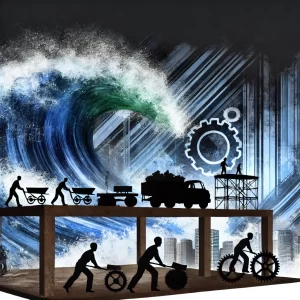 As we close out this series on the transformative impacts of AI and automation, it’s clear that these forces will not only reshape industries and professions but redefine the very nature of work—and potentially, what it means to be human. We’re standing on the brink of unprecedented change, a threshold that renowned thought leaders like Mustafa Suleyman, Ray Kurzweil, and Annaka Harris have been warning us about. Each of these visionaries has highlighted the enormous scale of disruption that AI, automation, and emerging technologies will unleash in the coming years. This final post is not just a wrap-up but a call to arms for individuals and organizations alike: Now is the time to prepare for what’s coming.
As we close out this series on the transformative impacts of AI and automation, it’s clear that these forces will not only reshape industries and professions but redefine the very nature of work—and potentially, what it means to be human. We’re standing on the brink of unprecedented change, a threshold that renowned thought leaders like Mustafa Suleyman, Ray Kurzweil, and Annaka Harris have been warning us about. Each of these visionaries has highlighted the enormous scale of disruption that AI, automation, and emerging technologies will unleash in the coming years. This final post is not just a wrap-up but a call to arms for individuals and organizations alike: Now is the time to prepare for what’s coming.
The Coming Wave: Mustafa Suleyman’s Vision of AI-Driven Disruption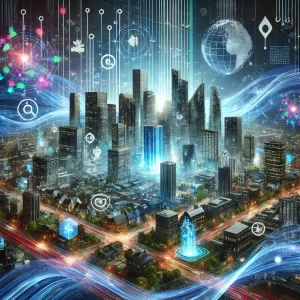
In The Coming Wave, Mustafa Suleyman warns us that AI isn’t merely a new tool but an unstoppable force poised to change the entire framework of society. He emphasizes that the era of rapid technological advancements will create a “tsunami of disruption,” sweeping away old norms and practices, and pushing us into a future that is not just faster but fundamentally different. According to Suleyman, this wave of change will outpace our traditional systems of governance, ethics, and education, leaving individuals and organizations scrambling to keep up.
This isn’t just a technological shift; it’s a fundamental overhaul of how we operate as societies, businesses, and individuals. Suleyman urges us to consider the vast ethical, social, and economic implications of AI and automation—and to act now to shape these developments responsibly. For individuals and organizations, his insights serve as a stark reminder: We cannot afford to remain passive bystanders. We must adapt, innovate, and prepare for an entirely new paradigm.
The Singularity is Nearer: Kurzweil’s Call for Urgency
 Ray Kurzweil’s The Singularity is Nearer takes this warning further, focusing on a concept he calls the “Singularity.” This is the point at which AI surpasses human intelligence, accelerating advancements so rapidly that the future becomes unpredictable. Kurzweil suggests that this tipping point could arrive within our lifetime, bringing with it monumental changes in every field—healthcare, finance, law, and beyond. The Singularity is not just a moment of enhanced capability; it represents a profound transformation in human existence itself.
Ray Kurzweil’s The Singularity is Nearer takes this warning further, focusing on a concept he calls the “Singularity.” This is the point at which AI surpasses human intelligence, accelerating advancements so rapidly that the future becomes unpredictable. Kurzweil suggests that this tipping point could arrive within our lifetime, bringing with it monumental changes in every field—healthcare, finance, law, and beyond. The Singularity is not just a moment of enhanced capability; it represents a profound transformation in human existence itself.
Kurzweil emphasizes that this convergence of human and machine intelligence will blur the boundaries between biology and technology, pushing us toward a future where human limitations are transcended by machine intelligence. For those who prepare, the Singularity holds the promise of unimaginable growth and advancement. For those who ignore it, however, it poses an existential threat. Kurzweil’s message is clear: We’re on the edge of a revolution, and how we prepare will determine our place in this new world.
Consciousness: Annaka Harris on the Moral Dilemma of AI
Annaka Harris’ exploration of consciousness adds another layer to the narrative. In her book Conscious, Harris delves into the nature of consciousness and raises the unsettling question: If AI were to achieve a form of self-awareness or sentience, what would our moral and ethical obligations be? Unlike traditional machines, an AI with consciousness could possess subjective experiences, challenging our deeply held beliefs about what it means to be alive and sentient. Harris’s work pushes us to confront the ethical dimensions of AI, beyond its functional uses.
Her insights remind us that we’re not merely building smarter tools; we’re potentially creating entities that could possess rights, emotions, or even the desire for autonomy. This potential shift from “tools” to “beings” creates a moral imperative for individuals and organizations: to think deeply about the ethical frameworks we’re creating and ensure that our integration of AI into society respects fundamental human values.
A Call to Arms: The Future is Here, and It Demands Action
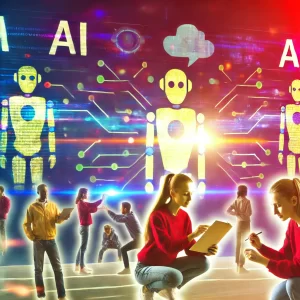 The combined insights of Suleyman, Kurzweil, and Harris leave no room for complacency. The age of AI isn’t on the horizon—it’s here, and it’s accelerating faster than many of us can grasp. As individuals, we must equip ourselves with the skills and knowledge to thrive in a landscape that will be unrecognizable within the next few decades. As organizations, we must create cultures that adapt to technological change with agility, prioritize ethical AI practices, and support our workforce in the shift to an AI-augmented future.
The combined insights of Suleyman, Kurzweil, and Harris leave no room for complacency. The age of AI isn’t on the horizon—it’s here, and it’s accelerating faster than many of us can grasp. As individuals, we must equip ourselves with the skills and knowledge to thrive in a landscape that will be unrecognizable within the next few decades. As organizations, we must create cultures that adapt to technological change with agility, prioritize ethical AI practices, and support our workforce in the shift to an AI-augmented future.
A Call for Proactive Engagement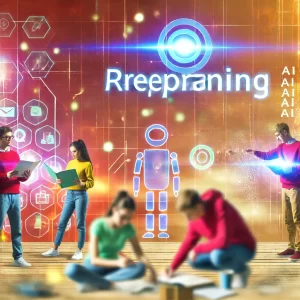
Now, more than ever, is the time for proactive engagement. This is not just about staying relevant in the job market or keeping pace with technology; it’s about preparing ourselves and our society for a world that is rapidly evolving.
Seizing the Opportunity to Shape the Future
We stand at a crossroads, faced with a rare opportunity to shape the future. The choices we make today will determine whether we can navigate this technological shift responsibly and create a world that aligns with human values.
Preparing for a Human-Centered, Technologically Driven Future
In this concluding post, we’ll explore practical strategies for both individuals and organizations. These approaches will help us lay the groundwork for a responsible, human-centered approach in a world increasingly shaped by AI and automation.
Next in the Series: Harnessing AI in Human-Centric Network Marketing
In our upcoming series, we’ll dive into the unique opportunity of leveraging AI in digitally driven network marketing—a human-centric entrepreneurial path designed to thrive in an AI-enhanced world. This strategy is not only future-proof but also emphasizes human relationships and personal growth, elements that technology alone cannot replace.
But first, let’s discuss how to prepare for and embrace the imminent changes ahead.
For Individuals: Practical Steps to Stay Relevant in the Evolving Job Market
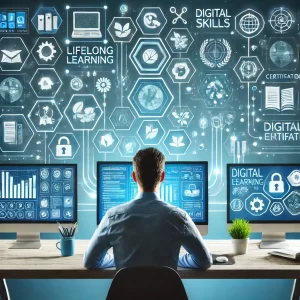 As automation, AI, and digital transformation become the norm, it’s crucial for individuals to proactively develop the skills and mindset that will keep them competitive and adaptable.
As automation, AI, and digital transformation become the norm, it’s crucial for individuals to proactively develop the skills and mindset that will keep them competitive and adaptable.
1. Embrace Lifelong Learning
In a world where technology is advancing at breakneck speed, a commitment to lifelong learning is essential. As we discussed in “Mapping the Workforce of Tomorrow,” the roles most resilient to automation are those requiring creative thinking, emotional intelligence, and strategic insight. To remain relevant, you must continuously adapt and expand your skillset.
Take Action:
- Enroll in courses that build your digital literacy and sharpen your strategic mindset. Our online course, Mastering the Art of Wealth Creation: A Journey Through Mind Power and Marketing, is designed to empower you with the insights and tools to thrive in this evolving landscape.
- Seek out certifications and projects that develop adaptable skills, from data analysis to AI literacy, to ensure you’re prepared for the future workforce.
- Embrace digital tools that amplify your value, making you indispensable in a world increasingly defined by AI and automation.
Through this course, you’ll gain access to proven strategies, expert insights, and a supportive community to help you master digital marketing, network building, and wealth creation—essential skills for future-proofing your career and financial well-being.
2. Focus on “Human-Centric” Skills
Jobs that leverage uniquely human qualities—such as creativity, empathy, critical thinking, and adaptability—are less likely to be automated. AI can analyze data at astonishing speeds, but it lacks emotional intelligence and creativity.
- Take Action: Invest time in developing your communication, collaboration, and creative problem-solving skills. For example, skills in leadership and cross-functional teamwork will become increasingly valuable as workplaces incorporate more AI-driven systems.
3. Build a Digital Presence
The digital transformation we explored in “The Role of Digital Marketing in the New Economy” has opened new channels for individuals to establish a professional presence and build networks. Building your digital brand allows you to remain visible and relevant in a highly competitive market.
- Take Action: Create and maintain an active LinkedIn profile, start a blog or personal website, and participate in digital communities. Establishing your expertise and thought leadership online can set you apart in a competitive job market.
4. Experiment with AI Tools
In “The Automation Scenarios: Predicting the Impact,” we discussed how quickly technology adoption can accelerate changes in the workforce. Becoming familiar with AI tools—such as chatbots, analytics software, and automation platforms—allows you to understand the potential applications and limits of AI firsthand.
- Take Action: Explore platforms like ChatGPT, Midjourney, and midjourm. Experimenting with AI will help you see how these tools can augment your skills and enhance your productivity, preparing you for a future where AI is your collaborator.
For Organizations: Adapting to Leverage AI While Supporting the Workforce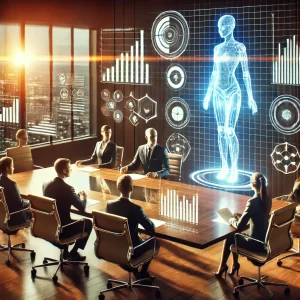
For organizations, the integration of AI isn’t just about increasing efficiency; it’s about creating a forward-thinking culture that values human-AI collaboration. As we highlighted in “Human-AI Synergy: The Future of Collaboration,” businesses that embrace this mindset are poised for long-term resilience.
1. Invest in Workforce Development
Organizations that prioritize workforce development will have a significant advantage. AI may change the structure of jobs, but upskilling and reskilling employees will ensure they remain valuable.
- Take Action: Develop programs that support continuous learning and skill-building within your workforce. Whether through on-the-job training, partnerships with educational institutions, or internal workshops, creating a culture of learning is essential.
2. Implement Responsible AI Practices
Ethical AI governance, as outlined in “AI Governance: The Need for Ethical Frameworks and Policies,” is no longer optional—it’s a competitive differentiator. Ethical AI practices build trust with consumers and employees alike.
- Take Action: Establish guidelines and accountability measures for the use of AI, ensuring fairness and transparency. Regularly audit AI systems for bias, and develop protocols for responsible data management and privacy protection.
3. Foster Human-AI Collaboration
AI should be seen as an augmentation tool, not a replacement for human ingenuity. The most successful companies will integrate AI systems that support human decision-making and creativity.
- Take Action: Invest in AI solutions that enhance human work rather than replace it. For example, use AI to automate data analysis so employees can focus on interpreting insights and making strategic decisions.
4. Create a Vision for an AI-Integrated Culture
AI can only succeed if employees feel empowered to use it. Organizations need to foster a culture where AI is viewed as an ally, not an adversary.
- Take Action: Clearly communicate the role of AI in your company’s mission, including its benefits to employees and customers. Provide training and open channels for feedback, creating an environment where people feel supported in their journey to incorporate AI into their roles.
Looking Ahead: Preparing for the Long-Term Implications of AI and Automation
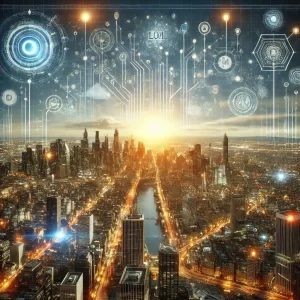 AI and automation represent a fundamental shift not only in work but in society as a whole. Preparing for this shift requires us to think beyond individual or organizational goals and consider the broader societal implications.
AI and automation represent a fundamental shift not only in work but in society as a whole. Preparing for this shift requires us to think beyond individual or organizational goals and consider the broader societal implications.
1. Building an Inclusive Future
As we’ve seen throughout this series, AI and automation bring potential for both opportunity and inequality. “The Socioeconomic Impact of Workforce Displacement” highlighted how automation could widen socioeconomic divides if left unchecked. An inclusive approach that considers diverse perspectives will be vital.
- Take Action: Advocate for policies that support equitable access to technology and education. Champion diversity in tech development to ensure AI systems are fair, accessible, and representative of all communities.
2. Balancing Efficiency with Ethical Responsibility
In “The Conscious AI Debate,” we discussed the moral considerations of a world where AI could possess its own form of consciousness. As we approach this possibility, we must balance efficiency gains with ethical responsibilities.
- Take Action: Engage with ethical frameworks and consider the impact of AI beyond profit. Encourage responsible tech use that respects the dignity of work and upholds the fundamental values of society.
3. Embracing Human-Centric Entrepreneurship
In our next blog series, we’ll explore how to capitalize on the advancements in AI and automation by integrating them into human-centered, digitally driven network marketing. As technology enables more flexible and scalable business models, the opportunity to become a digital entrepreneur has never been greater.
- Take Action: Join us in our private Facebook group, John Rogers – Digital Marketing Secrets for Network Marketing Success, where we discuss practical steps to harness AI in building a resilient, future-proof income stream. Our community is a hub for forward-thinking entrepreneurs ready to navigate the evolving landscape with confidence and purpose.
Conclusion: The Path Forward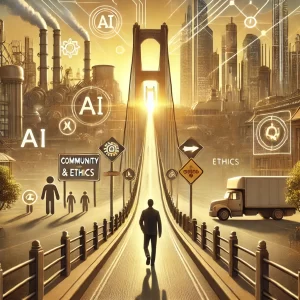
The rapid evolution of AI, automation, and digital transformation is creating both challenges and unprecedented opportunities. For individuals, the focus should be on cultivating adaptability, human-centric skills, and a digital presence. Organizations, meanwhile, must prioritize workforce development, ethical AI governance, and a culture of human-AI collaboration.
But beyond personal and organizational preparation, there is a larger call to action. As we approach a future where AI plays an increasingly central role, the importance of community and shared knowledge cannot be overstated. Our private Facebook group, is a space for those ready to embrace AI’s transformative potential and apply it to building sustainable, entrepreneurial ventures.
This is just the beginning. As we move into the next phase of AI’s integration with human endeavors, join us on this journey to harness technology for personal growth, resilience, and meaningful impact.
#AI #FutureOfWork #HumanAICollaboration #Automation #DigitalTransformation #WorkforceDevelopment #EthicalAI #Entrepreneurship #FutureReady #DigitalMarketing
4o

John Rogers is a former Wall Street portfolio manager and served as CEO of Premium Enterprises and President of The Colorado Tire Recycling Center. He transitioned to digital marketing, founding WealthCreationMastermind.com to empower home-based entrepreneurs with cutting-edge strategies. Creator of the “Mastering the Art of Wealth Creation” online course, John has driven significant growth in network marketing, achieving the Blue Diamond rank and earning the title of Univera Associate of the Year in 2015. His expertise in leveraging technology for financial success transforms how entrepreneurs achieve their business goals.